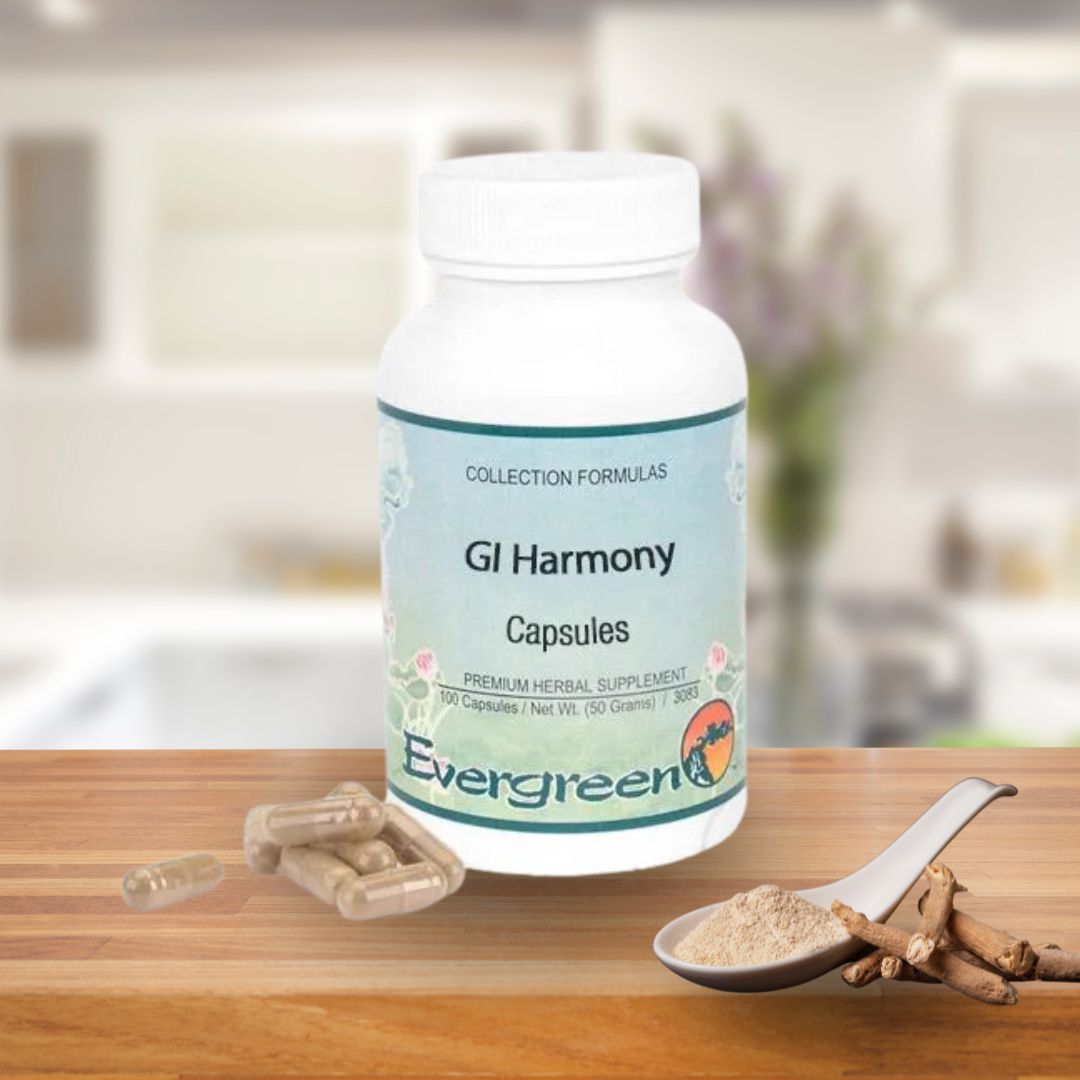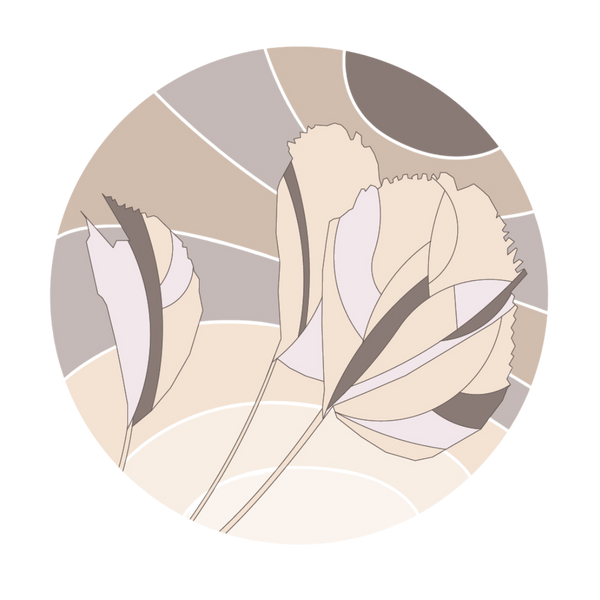1
/
of
1
ORGANIC QI
GI Harmony
GI Harmony
Regular price
$27.90 USD
Regular price
Sale price
$27.90 USD
Unit price
/
per
Couldn't load pickup availability
Clinical Applications
Clinical Applications
- Irritable bowel syndrome (IBS)
- Disharmony of the GI tract: alternating diarrhea and constipation with abdominal bloating, pain, flatulence and a feeling of incomplete evacuation, and straining and urgency of bowel movements
- Various bowel disorders, such as diverticulitis, mucous colitis, nervous bowel, irritable colon, and spastic colon
Actions
Actions
- Soothes the irritation of the gastrointestinal tract caused by drugs, chemicals, and certain foods
- Regulates and restores gastrointestinal functions
- Relieves diarrhea and constipation
- Alleviates pain, inflammation, spasms and cramps
- Relieves bloating, flatulence, and inflammation
Cautions and Contra-Indications
Cautions and Contra-Indications
- This formula is contraindicated during pregnancy and nursing.
- This herbal formula contains herbs that invigorate blood circulation, such as Dang Gui (Radix Angelicae Sinensis). Therefore, patients who are on anticoagulant or antiplatelet therapies, such as Coumadin (warfarin), should use this formula with caution, or not at all, as there may be a higher risk of bleeding and bruising.
Nutrition and Lifestyle Instructions
Nutrition and Lifestyle Instructions
- Diet is essential to complete recovery. Foods that are associated with gas production should not be consumed, such as onions, soda, beans, cabbage, brussel sprouts, cauliflower and broccoli. Use of probiotics helps to relieve bloating and other symptoms of IBS.
- Eat a variety of fresh, organic fruits and vegetables of all colors.
- Incorporate more high-fiber whole grains and nuts into diet.
- Drink warm or hot liquids with meals. Putting cold and ice on any part of the body will immediately constrict the flow of blood to that region. Similarly, drinking cold or iced drinks with meals will hinder the natural peristaltic movements of the digestive system.
- Foods with antioxidant effects, such as vitamin A, C and E are beneficial as they neutralize the free radicals and minimize damage to cells. Beneficial foods include citrus fruits, carrots, green leafy vegetables, and green tea.
- Chew food completely and thoroughly. The digestive tract can process and absorb smaller pieces of food much better than food that is incompletely chewed. Larger pieces of food can lead to incomplete digestion and digestive discomfort.
- Always eat breakfast. According to the TCM clock, the most optimal time for the digestive system is in the morning from 8 to 10 a.m.
- Give the body two to three hours between the last meal of the day and bedtime. During sleep, the digestive system slows down as well. Make sure the body has adequate time to digest the food before going into sleep mode.
- If the patient is allergic to any food or feel uncomfortable after eating certain foods, avoid eating them.
- Avoid fast food, processed foods, junk food, artificial sugars, and carbonated drinks. Stay away from meat, greasy food, alcohol, caffeine, dairy products (except for unsweetened low-fat yogurt), tap water, iron supplements, and vegetables and fruits with pesticides.
- The Spleen is responsible for generating post-natal qi and good Spleen function also contributes to a healthy immune system. Foods that damage the Spleen should be avoided:
- Avoid any and all foods that contain sugar, such as cake, dessert, candy, chocolate, canned juice, soft drinks, caffeinated drinks, stevia, sugar substitutes, agave, xylitol, and corn syrup.
- Avoid raw or uncooked meats, such as sashimi, sushi, steak tartar, and seared meat.
- Minimize consumption of foods that are cooling in nature, including tofu, tomato, celery, asparagus, bamboo, seaweed, kelp, bitter melon, cucumber, gourd, luffa, eggplant, winter melon, watermelon, honeydew, citrus, oranges, guava, grapefruit, pineapple, plums, pear, banana, papaya, white radish, mustard leaf, potherb mustard, Chinese kale, napa, and bamboo sprout. Do not eat foods straight from the refrigerator. Long-term intake of cold fruits and vegetables like the ones listed above may be
damaging to the Spleen. The cooling property of foods can be neutralized by cooking or adding 20 pieces of Gou Qi Zi (Fructus Lycii).
- Avoid carbohydrates like white rice or bread as they may produce dampness.
- No seafood especially shellfish, like crabs, oyster, scallops, clams, lobster and shrimp (they enter the yangming Stomach channel).
- Avoid fermented foods like cheese or fermented tofu.
- Do not eat dairy products, such as milk, cream, cheese, and ice cream.
- No lamb, beef, goose or duck.
- Avoid deep-fried or greasy foods. - Warm and hot natured foods that damage qi and yin should be avoided, such as:
- certain fruits like mango and durian that produce heat.
- stimulants like coffee, alcohol, and energy drinks.
- spicy/pungent/aromatic vegetables such as pepper, garlic, onions, basil, rosemary, cumin, funnel, anise, leeks, chives, scallions, thyme, saffron, wormwood, mustard, chili pepper, and wasabi.
- Avoid food and drinks with artificial coloring.
- Consume as few meat products as possible. Do not eat processed meats, such as lunch meats, hot dogs and sausages, as they contain nitrites that are associated with inflammation and chronic disease. - Stress is a major factor in patients suffering from IBS. A relaxed or positive outlook on life is very important to recovery. Patients should be advised to learn to become more relaxed.
- Application of a heat pad to the abdomen may help with relieving pain associated with bloating and distension. Light abdominal massage in circular motions clockwise and then counterclockwise starting from small circles gradually becoming bigger may also help relieve distension, discomfort and pain. A five-minute abdominal massage is recommended daily. Patients should be advised to pass gas whenever needed to relieve qi stagnation.
- Chronic diarrhea may be alleviated with topical application of herbs. Grind She Chuang Zi (Fructus Cnidii) or Wu Zhu Yu (Fructus Evodiae) into a fine powder, dry fry the powder until it is warm, and place the powder on the umbilicus covered by gauze or tape. Change the powder every 24 hours. If the herbs are unavailable, 60g of sea salt
may be used as a substitute.
Dosage
Dosage
Take 3 to 4 capsules three times daily with warm water. Dosage can be increased up to 8 to 10 capsules three times daily in acute cases until symptoms subside. For maximum effectiveness, take the herbs on an empty stomach.
Ingredients
Ingredients
- Radix Paeoniae Alba
- Radix Angelicae Dahuricae
- Rhizoma Atractylodis Macrocephalae
- Herba Menthae
- Radix Bupleuri
- Semen Plantaginis
- Pericarpium Citri Reticulatae
- Radix Vladimiriae
- Radix Angelicae Sinensis
- Radix Codonopsis
- Radix Saposhnikoviae
- Poria
- Cortex Magnoliae Officinalis
- Cortex Phellodendri Chinensis
- Rhizoma Coptidis
- Herba Agastaches
- Rhizoma Zingiberis Praeparatum
- Cortex Fraxini
- Fructus Schisandrae Chinensis
- Semen Coicis
- Herba Artemisiae Scoparias
- Radix et Rhizoma Glycyrrhizae Praeparata cum Melle
Share


